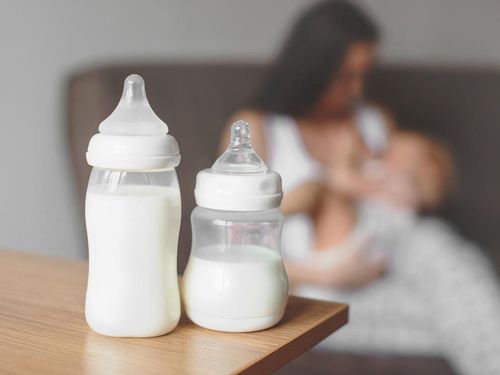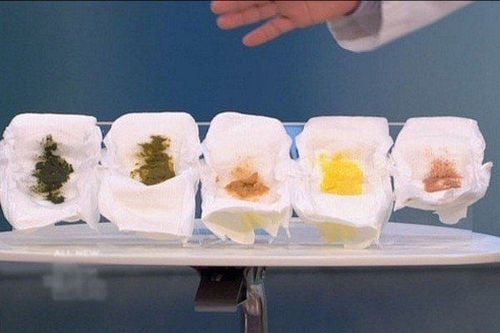This is an automatically translated article.
Bloating and bloating are common phenomena in babies, making parents - especially young mothers / fathers extremely worried. Furthermore, babies' constant fussiness without being able to communicate further confuses many families. In this article, the reasons why your baby is full and vomiting will be answered, and provide some more ways to deal with it.
1. Get an overview of flatulence in babies/infants
At a young age, bloating and gas will become more common, and especially often in infants. When babies get gas, they will be very uncomfortable inside, which leads to constant fussiness and not eating / not sucking milk. If this picky eating situation is prolonged, the baby will face the risk of serious malnutrition.2. What are the signs that the baby is bloated?
When the baby is bloated, although he can't communicate with his parents verbally, the baby still tells us through a number of body signs as follows:
The baby's abdomen is always in a tight and round shape after Last meal 1 to 2 hours. When you pat your baby's belly, you'll hear a sound similar to drumming. Gas and heartburn after meals are common when babies have gas. The baby is constantly crying after eating, showing signs of anorexia / lazy to breastfeed. Your baby's poop can be very constipated or very loose, and he won't pass gas. When there is one or more signs in the above group, this indicates that the baby has gas. Some babies experience bloating and vomiting if this digestive condition is related to medical conditions, or simply because the baby is crying so much that the body temperature tends to rise.

Em bé bị đầy hơi có thể xuất hiện triệu chứng quấy khóc liên tục sau ăn
3. What causes bloating/flatulence in babies?
3.1 Colic syndrome may be the cause of colic in children There have been many studies showing that there is a close relationship between gas and bloating in young children and Colic syndrome. This syndrome occurs in 20% of infants and usually begins mainly during the first 3 weeks of age, lasting about 3 hours per day and 3 days a week. This syndrome will peak at the 6th week - the most uncomfortable period of the baby and then gradually subside until the 16th week when it ends.
Scientists explain this connection because the pressure in the abdomen will increase sharply when the baby is bloated, causing gastric juice as well as gas in the abdomen to find somewhere to escape. Meanwhile, the child's oesophagus has not yet been able to close and open well on its own, making this pressure even heavier and making the child malabsorption, and causing the baby to have severe bloating and vomiting.
3.2 The problem of malabsorption of nutrients from milk This phenomenon happens a lot for babies using formula or milk has problems because the mother's diet has too many foods that cause indigestion and bloating. In addition, your baby may also have a intolerance to the lactose present in breast milk/formula. This is because the baby's body does not produce the digestive enzyme for lactose, leading to bloating, vomiting and fever.
3.3 Due to the effects of drugs Medicines to treat diseases, especially antibiotics, have many negative effects on young children. The intestinal microflora of children / infants is still not stable, if using antibiotics, the beneficial bacteria of the intestine will be destroyed and imbalance the overall microflora, making the health of the intestines worse. bowel decline.
3.4 Children with bloating and vomiting due to early weaning Eating solids too early when the digestive system is still incomplete will expose the baby's intestines to different foods. When not able to adapt and digest, this amount of food can linger in the stomach, then ferment and create gas in the stomach, leading to a full stomach.
Besides, when entering the weaning diet, if you design meals too close together, or force your child to eat too much each time, it can also cause overload in the digestive system.

Bé bị đầy bụng và nôn có thể do ăn dặm quá sớm
4. How to handle when the baby has a full stomach and vomiting fever?
When identifying your child with gas through the signs, try some solutions to improve his symptoms first.
4.1 Rub your baby's tummy after breastfeeding or eating After finishing a feed/meal, you can place your fingers on the center of your baby's belly and gently rub it in a clockwise direction. This movement can help your baby slowly digest and feel more comfortable.
4.2 Support your baby to perform a bicycle-like movement First, place your baby on his back and gently pull his left and right leg in turn, similar to a normal adult bicycle movement. When doing this movement, the excess gas in the baby's stomach will be pushed out slowly.
4.3 Patiencely burp your baby after breastfeeding Once your baby finishes feeding, hold your baby and gently pat him on the back to help him burp. This has the effect of pushing the gas inside the stomach out and making the baby no longer uncomfortable by colic.
4.4 Giving probiotics to babies Yogurt and some benign probiotic products have the ability to improve colic and vomiting in babies.
5. When to take your baby to the doctor when the baby has gas?
Most cases of children with gas and vomiting do not need medical intervention but just some gentle manipulations to handle the gas in the child's abdomen. However, if your baby has the following additional signs, you need to find a pediatrician as soon as possible for support:
The child has persistent diarrhea / constipation without any cause. The baby constantly stops nursing and is fussy, not falling asleep. Your baby's stools are bloody or strangely colored. It can be said that in the matter of taking care of young children and babies, flatulence is almost a regular occurrence. Therefore, you need to know the methods of handling to make your baby more comfortable. In addition, when your child has bloating and vomiting for several days or is severe, you should see a doctor for better treatment.
Please dial HOTLINE for more information or register for an appointment HERE. Download MyVinmec app to make appointments faster and to manage your bookings easily.













